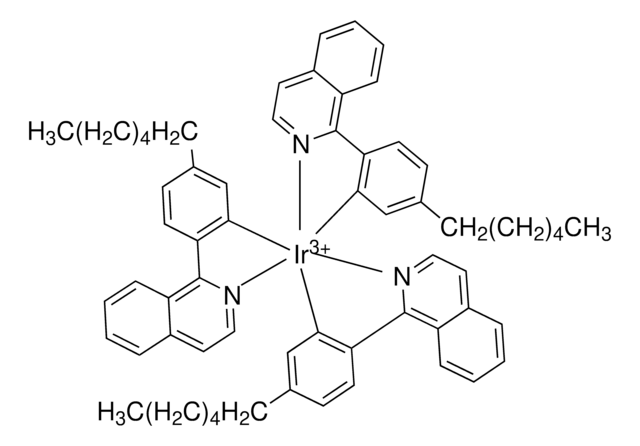About This Item
Recommended Products
Assay
98%
form
powder or crystals
mp
303-308 °C
λmax
308 nm in dichloromethane
semiconductor properties
P-type (mobility=8×10−5 cm2/V·s)
SMILES string
c1ccc(cc1)-c2c3cc4ccccc4cc3c(-c5ccccc5)c6cc7ccccc7cc26
InChI
1S/C34H22/c1-3-11-23(12-4-1)33-29-19-25-15-7-9-17-27(25)21-31(29)34(24-13-5-2-6-14-24)32-22-28-18-10-8-16-26(28)20-30(32)33/h1-22H
InChI key
PFCSVQKCECNEAZ-UHFFFAOYSA-N
General description
Application
- Used as a small molecule electron donor or p-type semiconductor in solution processed organic solar cells.
- Used as a red emitting dopant in organic light emitting diodes (OLEDs).
- Used as a high mobility charge transport material in organic thin film transistors (OTFTs).
Certificates of Analysis (COA)
Search for Certificates of Analysis (COA) by entering the products Lot/Batch Number. Lot and Batch Numbers can be found on a product’s label following the words ‘Lot’ or ‘Batch’.
Already Own This Product?
Find documentation for the products that you have recently purchased in the Document Library.
Articles
Intrinsically stretchable active layers for organic field-effect transistors (OFET) are discussed. Polymer structural modification & post-polymerization modifications are 2 methods to achieve this.
Solution-processed organic photovoltaic devices (OPVs) have emerged as a promising clean energy generating technology due to their ease of fabrication, potential to enable low-cost manufacturing via printing or coating techniques, and ability to be incorporated onto light weight, flexible substrates.
Thin, lightweight, and flexible electronic devices meet widespread demand for scalable, portable, and robust technology.
Our team of scientists has experience in all areas of research including Life Science, Material Science, Chemical Synthesis, Chromatography, Analytical and many others.
Contact Technical Service







